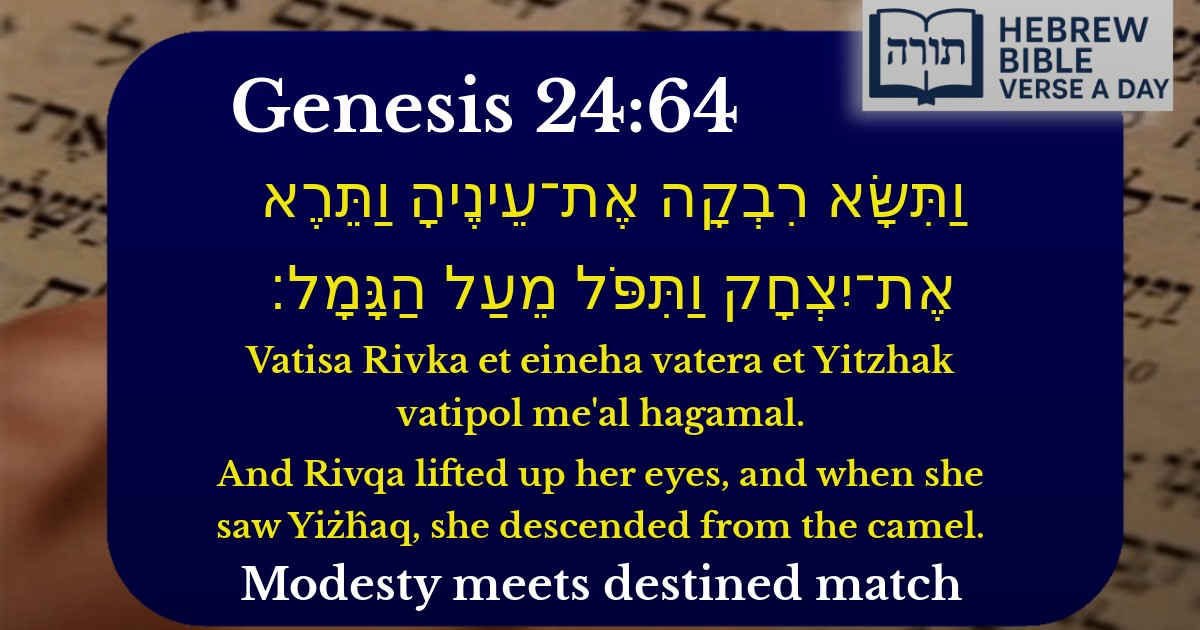Join Our Newsletter To Be Informed When New Videos Are Posted
Join the thousands of fellow Studends who rely on our videos to learn how to read the bible in Hebrew for free!
Hebrew Text
וַתִּשָּׂא רִבְקָה אֶת־עֵינֶיהָ וַתֵּרֶא אֶת־יִצְחָק וַתִּפֹּל מֵעַל הַגָּמָל׃
English Translation
And Rivqa lifted up her eyes, and when she saw Yiżĥaq, she descended from the camel.
Transliteration
Vatisa Rivka et eineha vatera et Yitzhak vatipol me'al hagamal.
Hebrew Leining Text
וַתִּשָּׂ֤א רִבְקָה֙ אֶת־עֵינֶ֔יהָ וַתֵּ֖רֶא אֶת־יִצְחָ֑ק וַתִּפֹּ֖ל מֵעַ֥ל הַגָּמָֽל׃
וַתִּשָּׂ֤א רִבְקָה֙ אֶת־עֵינֶ֔יהָ וַתֵּ֖רֶא אֶת־יִצְחָ֑ק וַתִּפֹּ֖ל מֵעַ֥ל הַגָּמָֽל׃
🎵 Listen to leining
Parasha Commentary
📚 Talmud Citations
This verse is quoted in the Talmud.
📖 Megillah 13b
The verse is cited in the context of discussing the modesty of Rivqa (Rebecca) and her immediate recognition of Yitzchak (Isaac).
📖 Bava Metzia 87a
The verse is referenced in a discussion about the hospitality shown by Avraham's servant and Rivqa's actions upon seeing Yitzchak.


The Significance of Rivka's Actions
The verse (Bereshit 24:64) describes Rivka's reaction upon seeing Yitzchak for the first time. Rashi explains that she "descended from the camel" in an act of great modesty (צניעות), as she perceived Yitzchak's elevated spiritual stature. The Midrash (Bereshit Rabbah 60:15) adds that she saw him resembling an angel, prompting her immediate dismount as a sign of respect.
Why She Fell from the Camel
The Talmud (Moed Katan 9b) notes that camels were often ridden in a straddling position, making Rivka's descent particularly noticeable. The Kli Yakar emphasizes that her fall was not accidental but deliberate—she was so overwhelmed by Yitzchak's holiness that she could not remain seated. The Malbim further explains that this demonstrated her innate righteousness, as she instinctively recognized kedusha (holiness).
Symbolism of the Camel
Yitzchak's Appearance
Ramban suggests Yitzchak was returning from prayer at Mount Moriah (the site of the Akeidah), radiating divine light. The Or HaChayim connects this to his name יצחק (laughter), symbolizing the joy of divine service that Rivka perceived.